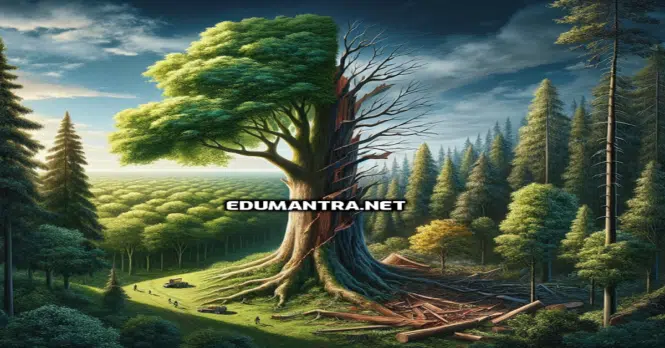
Here is On Killing a Tree, a detailed exploration and explanation of the figure of speech and its many facets. In this post, we have explained various examples of figurative speech, providing a comprehensive understanding of On Killing a Tree in terms of all Poetic Device. We have also told the reason why a particular figure of speech occurs in a particular line. This is going to help the children of various classes Class IX. Dive in for figure of speech examples-
Table of Contents
Figure of Speech in On Killing a Tree Stanza 1
It takes much time to kill a tree,
Not a simple jab of the knife
Will do it. It has grown
Slowly consuming the earth,
Rising out of it, feeding
Upon its crust, absorbing
Years of sunlight, air, water,
And out of its leprous hide
Sprouting leaves.
1. Figure of Speech: Enjambment
– Exact Line: Throughout the stanza
– Reason: The sentences flow over from one line to the next without a grammatical break, creating a sense of continuity and natural flow in the poem’s narration.
2. Figure of Speech: Imagery
– Exact Line: “Slowly consuming the earth, / Rising out of it, feeding / Upon its crust, absorbing / Years of sunlight, air, water,”
– Reason: These lines provide a detailed visual description of the tree’s growth, evoking images of the tree consuming nutrients and elements from the earth and atmosphere.
3. Figure of Speech: Metaphor
– Exact Line: “leprous hide”
– Reason: The bark of the tree is compared to a “leprous hide,” suggesting a rough, diseased appearance. This metaphor draws a comparison to the disfigured skin of a person with leprosy.
4. Figure of Speech: Hyperbole
– Exact Line: “It takes much time to kill a tree,”
– Reason: This is an exaggeration to emphasize the long period and effort required to destroy a tree, highlighting the tree’s resilience and strength.
5. Figure of Speech: Synecdoche
– Exact Line: “jab of the knife”
– Reason: Here, the ‘knife’ represents a broader range of tools or actions used to harm or cut down a tree. It’s a part (knife) representing the whole (all tools or actions).

6. Figure of Speech: Alliteration
– Exact Line: “Slowly consuming”
– Reason: The repetition of the ‘s’ sound in “Slowly consuming” creates a soft, hissing sound, enhancing the rhythm and flow of the line.
7. Figure of Speech: Personification
– Exact Line: “It has grown / Slowly consuming the earth,”
– Reason: The tree is given human-like qualities, described as if it is actively consuming the earth, which is a characteristic associated with living beings, not trees.
Also Read:
- Hard Words : On Killing a Tree
- On Killing a Tree MCQ
- On Killing a Tree NCERT Solutions
- On Killing A Tree Summary Class 9 in English
- On Killing a Tree Paraphrasing
On Killing a Tree Poetic Device- Stanza- 2
So hack and chop
But this alone wont do it.
Not so much pain will do it.
The bleeding bark will heal
And from close to the ground
Will rise curled green twigs,
Miniature boughs
Which if unchecked will expand again
To former size.
1. Figure of Speech: Alliteration
– Exact Line: “bleeding bark”
– Reason: The repetition of the ‘b’ sound in “bleeding bark” creates a rhythmic effect, emphasizing these words and drawing attention to the imagery.
2. Figure of Speech: Enjambment
– Exact Line: Throughout the stanza
– Reason: The sentences continue from one line to the next without a grammatical break, maintaining the poem’s fluidity and sense of continuity.
3. Figure of Speech: Personification
– Exact Line: “The bleeding bark will heal”
– Reason: The tree is personified through the use of the word ‘bleeding’, typically a human attribute, suggesting that the tree experiences harm in a similar way to a living creature.
4. Figure of Speech: Metaphor
– Exact Line: “bleeding bark”
– Reason: The sap of the tree is metaphorically described as blood, suggesting that the tree’s sap is akin to human blood, symbolizing life and vitality.
5. Figure of Speech: Symbolism
– Exact Line: “curled green twigs, / Miniature boughs”
– Reason: These elements symbolize new life and resilience, as the tree attempts to regrow even after being damaged.
6. Figure of Speech: Hyperbole
– Exact Line: “Not so much pain will do it.”
– Reason: This is an exaggeration of the tree’s ability to withstand damage, emphasizing its resilience.
7. Figure of Speech: Irony
– Exact Line: “But this alone wont do it.”
– Reason: There’s an irony in how hacking and chopping, which are typically destructive actions, are deemed insufficient to kill the tree, contrary to what one might expect.
8. Figure of Speech: Imagery
– Exact Line: “And from close to the ground / Will rise curled green twigs,”
– Reason: These lines create a vivid image of new growth sprouting from the tree, enhancing the visual aspect of the poem.
Also Read:
- On Killing a Tree Class 9 Summary in Hindi
- On Killing A Tree Class 9 Extra Questions and Answers
- Theme of On Killing A Tree Class 9
- On Killing a Tree Question and Answers
- On Killing a Tree – Important Extra Questions- Short Answer Type
Figures of Speech Poem – On Killing a Tree Stanza- 3
No,
The root is to be pulled out —
Out of the anchoring earth;
It is to be roped, tied,
And pulled out — snapped out
On Killing a Tree
Or pulled out entirely,
Out from the earth-cave,
And the strength of the tree exposed
The source, white and wet,
The most sensitive, hidden
For years inside the earth.
1. Figure of Speech: Alliteration
– Exact Line: “white and wet”
– Reason: The repetition of the ‘w’ sound in “white and wet” creates a rhythmic effect, drawing attention to the description of the root.
2. Figure of Speech: Repetition
– Exact Line: “pulled out” and “out”
– Reason: The phrase “pulled out” and the word “out” are repeated multiple times, emphasizing the effort and action needed to remove the tree’s root.
3. Figure of Speech: Enjambment
– Exact Line: Throughout the stanza
– Reason: The sentences continue from one line to the next without a grammatical break, maintaining the poem’s fluidity and sense of continuity.
4. Figure of Speech: Personification
– Exact Line: “And the strength of the tree exposed”
– Reason: The tree is given human-like qualities, with its ‘strength’ being exposed, typically a characteristic of living beings.
5. Figure of Speech: Metaphor
– Exact Line: “Out from the earth-cave,”
– Reason: The ground where the roots are embedded is likened to a ‘cave’, a metaphor suggesting protection and concealment.
6. Figure of Speech: Synecdoche
– Exact Line: “The root is to be pulled out”
– Reason: The ‘root’ represents the entire tree, symbolizing the effort to destroy the whole tree.
7. Figure of Speech: Imagery
– Exact Line: “The source, white and wet,”
– Reason: This line creates a vivid visual image of the tree’s root system, described as ‘white and wet’, which evokes a strong sensory experience.
Also Read:
- On Killing a Tree – Important Extra Questions- Long Answer Type
- On Killing a Tree- Introduction
- On Killing a Tree – Quick Review of the Poem
- On Killing a Tree-Comprehension Passages
On Killing a Tree Poetic Device- Stanza- 4
Then the matter
Of scorching and choking
In sun and air,
Browning, hardening,
Twisting, withering,
And then it is done.
1. Figure of Speech: Imagery
– Exact Line: “scorching and choking / In sun and air, / Browning, hardening,”
– Reason: These lines create vivid images of the tree’s suffering and decay under harsh conditions, engaging the reader’s senses to visualize the process.
2. Figure of Speech: Assonance
– Exact Line: “Twisting, withering,”
– Reason: The repetition of the ‘i’ sound in “Twisting, withering” adds a musical element to the poem, enhancing its emotive quality.
3. Figure of Speech: Personification
– Exact Line: “withering,”
– Reason: Personification is used here to ascribe the tree with human-like qualities of aging or declining, typically associated with living beings.
Rhyme Scheme of On Killing A Tree
The poem has been written in free verse. There is no rhyme scheme and the length of the lines varies. Even the stanzas are not of equal length.